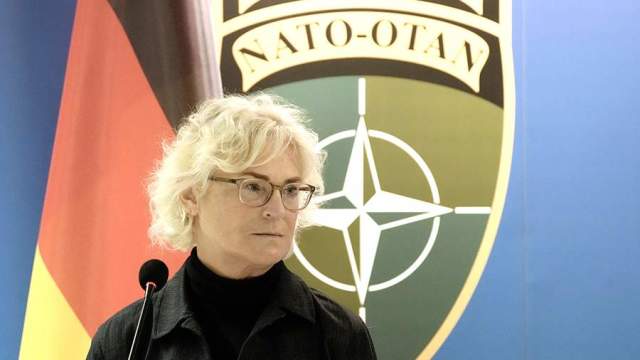German Defense Minister Kristine Lambrecht on Sunday, December 19, in an interview with Bild am Sonntag, said that the German authorities may use threats of sanctions against Russia against the background of the situation with Ukraine.
"We must use every opportunity to stop the escalation. This includes the threat of tough sanctions," she said.
Answering a question from journalists about whether Berlin is ready to send Bundeswehr soldiers to support Ukraine, the head of the defense department evaded a direct answer.
"We must exhaust all possibilities of diplomacy and economic sanctions. And all the next steps should be discussed in close coordination in the alliance (NATO)," the minister said.
In addition, Lambrecht noted that she can "understand Ukraine's fears very well" and therefore will make her first foreign trip as Defense Minister to Lithuania. There she will visit the NATO Rapid Reaction Force to get an idea of "how soldiers see the situation."
At the same time, when asked whether Nord Stream-2 could become part of the sanctions package, she stressed that "it is necessary to use all the tools that we have."
"Those who are responsible for aggression should feel the personal consequences. For example, the fact that they will not be able to go shopping on the Champs-Elysees in Paris," Lambrecht pointed out.
On December 17, German Finance Minister and leader of the Free Democratic Party Christian Lindner said that the German government is always interested in cooperation with Russia and the issue of SP-2 is only in the legal field. He believes that the West should not use the gas pipeline as a means of pressure on Russia.
At the same time, NATO Secretary General Jens Stoltenberg received security proposals from Russia. He noted that the alliance has clearly made it clear that it is ready to work on strengthening trust with Moscow.
On the same day, the Russian Foreign Ministry published the draft agreement of Russia with the United States and NATO on security guarantees. The documents have already been handed over to Washington and its allies. As follows from the documents, in particular, the alliance should refuse to conduct any military activity on the territory of Ukraine and other states of Eastern Europe, Transcaucasia and Central Asia.
In addition, Russian Deputy Foreign Minister Sergei Ryabkov said that Ukraine's involvement in NATO and the prospect of deploying alliance strike missile systems near the borders of the Russian Federation are an unacceptable threat to security. Moscow demands the withdrawal of the decision of the 2008 NATO summit in Bucharest that Ukraine and Georgia will become members of the alliance. However, there is no readiness on the part of the West for this, Ryabkov added.
As Russia's permanent representative to the European Union Vladimir Chizhov is convinced, the United States, with the help of NATO partners, has aggravated the already difficult situation in Ukraine to the limit. According to him, the statements of Russian officials in the Western media are censored. Russia is being made an "aggressor" without having any weighty arguments, he pointed out.

